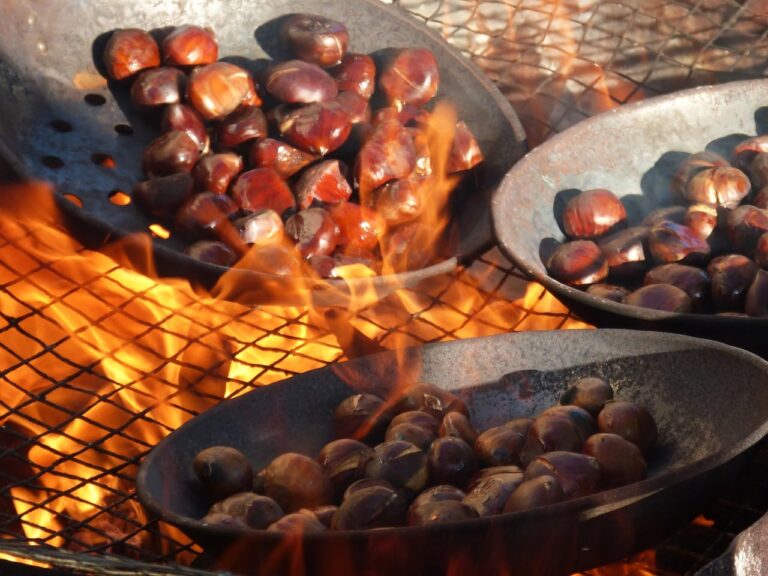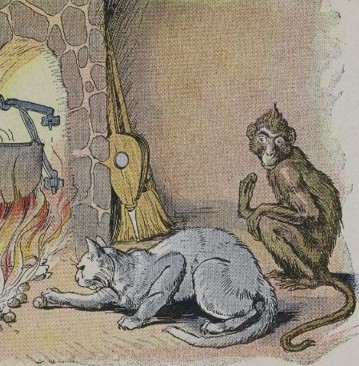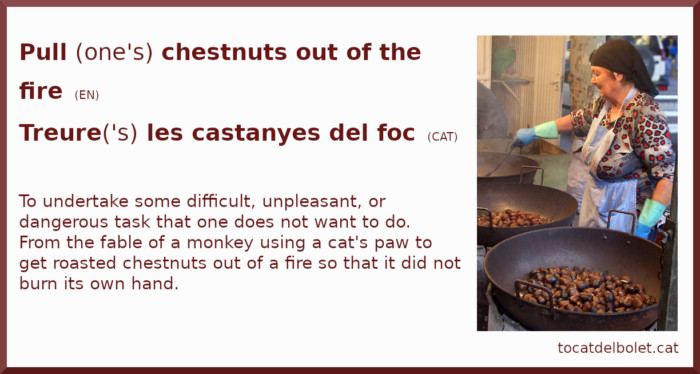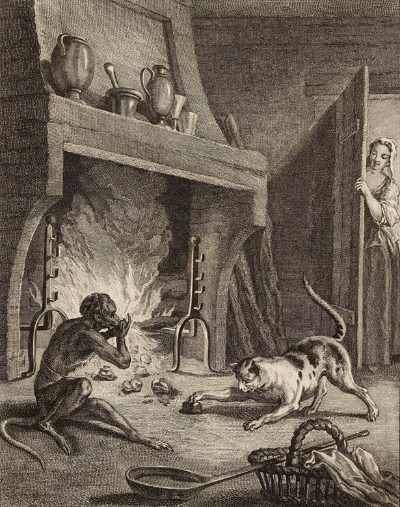
Page Description
Describes situations where someone manipulates
another into doing a difficult
or risky task for their own benefit.
De kastanjes uit het vuur halen: d.w.z. een gevaarlijken arbeid verrichten voor een ander, die zich zelven buiten schot houdt en er het voordeel van geniet.

To do a dangerous, hard, or unpleasant thing for someone else.
Collins Dictionary
The phrase “pull someone’s chestnuts out of the fire” is indeed derived from a fable involving a monkey using a cat to retrieve roasted chestnuts from a fire.
In the context of the fable, the monkey convinces the cat to do the difficult and dangerous task of retrieving the chestnuts, only to reap the benefits for itself while leaving the cat with nothing.
De kastanjes voor iemand uit het vuur halen
Een lastige kwestie opknappen voor iemand die zich er zelf aan onttrekt. Deze uitdrukking is ontleend aan de fabel waarin een aap die kastanjes uit het vuur wilde halen en bang was zich te branden, daarvoor de poot van een vlak bij het vuur gelegen hond gebruikte.
A Risky Rescue: The Meaning Behind the Expression
The phrase “pull someone’s chestnuts out of the fire” evokes the image of a risky rescue—saving someone from trouble, often at one’s own expense. But beneath this seemingly noble act lies a darker reality: one person is being used, often unknowingly, for someone else’s gain. Rooted in an old fable, the expression captures how individuals can be manipulated into doing the dirty work while the true beneficiary remains in the shadows.
This idea is not just a linguistic curiosity—it reflects real-world injustices where institutions or individuals exploit others for their own benefit.
Let’s explore its origins, meaning, and how it resonates with the themes of power, deception, and accountability.
Een Gevaarlijke Reddeningsactie: Wat Betekent Deze Uitdrukking?
De uitdrukking “iemands kastanjes uit het vuur halen” roept het beeld op van een riskante redding – iemand uit de problemen helpen, vaak ten koste van jezelf. Maar achter deze schijnbaar nobele daad schuilt een duistere werkelijkheid: iemand wordt gebruikt, vaak zonder het te beseffen, voor andermans gewin. Deze uitdrukking vindt haar oorsprong in een oude fabel en laat zien hoe mensen kunnen worden gemanipuleerd om het vuile werk op te knappen, terwijl de werkelijke begunstigde buiten schot blijft.
Dit is niet alleen een taalkundige curiositeit, maar weerspiegelt ook echte onrechtvaardigheden, waarbij instellingen of individuen anderen uitbuiten voor eigen voordeel.
Laten we de oorsprong, betekenis en relevantie van de uitdrukking verkennen binnen de thema’s van macht, misleiding en verantwoordelijkheid.
In a broader sense, the expression can be used metaphorically to describe situations where someone manipulates or takes advantage of another person to accomplish a task or achieve a goal, often leaving the helper with little or no benefit and sometimes harm.
It can imply the exploitation of someone for one’s own gain, and it may involve deceit or manipulation.
So, the understanding that it can be used with potentially bad intentions aligns with the historical context of the fable and the idiomatic use of the expression.

Een moeilijke, onaangename of gevaarlijke taak op zich nemen die men niet wil doen. Van de fabel van een aap die een kattenpoot gebruikte om geroosterde kastanjes uit een vuur te halen zodat hij zijn eigen hand niet verbrandde.
Jo Hamilton ‘Continues to Fight’ as Post Office Scandal Inquiry Resumes
Cook hires some help to cut the head of a live chicken.
A presentation of the Just For Laughs Gags. The funny hidden camera pranks show for the whole family.
Post Office scandal: outrage as Channel 4 News reveals covert recordings
28 mrt 2024
There’s growing anger among politicians following the secret recordings – aired in our exclusive report on this programme last night – that prove Post Office bosses covered up the Horizon IT scandal for years.
The audio reveals that executives knew as far back as 2013 that subpostmasters’ accounts could be accessed remotely and altered without their knowledge. Pressure is also growing for the Post Office to face criminal action.
A System Weaponized Against the Innocent
How is it possible that a justice system—meant to uphold truth—was instead used as a tool to falsely accuse and destroy lives? The Post Office scandal is a haunting example of how power, when unchecked, can be turned against the very people it is meant to protect.
From the beginning, it was no secret that the Horizon software was flawed. Even Paul Patterson, Fujitsu’s European Director, admitted to Jason Beer KC during the Inquiry that there were known bugs. Yet, despite this, Gareth Jenkins, the expert witness called upon in multiple trials, failed to disclose these critical flaws to the courts. His silence—and the silence of many others—helped sustain wrongful prosecutions.
It is almost a miracle that among the Subpostmasters stood a man with the persistence of Gandhi—someone who refused to accept injustice. Allan Bates did all the right things: he carefully traced the discrepancies in his accounts, identified duplicate shortfalls, and reported them to his superiors. But when his warnings were ignored, he took action. He gathered fellow subpostmasters, and as they shared their stories, a striking pattern emerged—each one had suffered in the same way.
Bates not only exposed the widespread nature of the injustice but also achieved what seemed impossible: a class action lawsuit against the Post Office. With no financial resources of their own, 555 subpostmasters stood together and fought against an institution with unlimited means. Their case reached the High Court, where Justice Peter Fraser delivered a resounding verdict in their favor.
This victory was remarkable not just for its legal outcome, but for the fact that it was a group effort.
Individually, they might have been crushed under the weight of false accusations. But together, they turned the tide, proving that those wrongfully branded as criminals were, in truth, the victims of a colossal miscarriage of justice.
Een systeem dat werd ingezet tegen onschuldigen
Hoe is het mogelijk dat een rechtssysteem – bedoeld om de waarheid te handhaven – in plaats daarvan werd gebruikt als een instrument om mensen vals te beschuldigen en hun levens te verwoesten? Het Post Office-schandaal is een schrijnend voorbeeld van hoe macht, wanneer deze niet wordt gecontroleerd, kan worden ingezet tegen de mensen die zij juist zou moeten beschermen.
Vanaf het begin was het geen geheim dat de Horizon-software gebrekkig was. Zelfs Paul Patterson, de Europese directeur van Fujitsu, gaf tijdens het onderzoek toe aan Jason Beer KC dat er bekende bugs waren. Toch verzweeg Gareth Jenkins, de deskundige getuige die in meerdere rechtszaken werd opgeroepen, deze cruciale tekortkomingen voor de rechtbank. Zijn stilzwijgen – en dat van velen anderen – hielp bij het in stand houden van de onterechte vervolgingen.
Het is bijna een wonder dat er onder de Subpostmasters één man was met de vasthoudendheid van Gandhi – iemand die weigerde zich bij deze onrechtvaardigheid neer te leggen. Allan Bates deed alles wat juist was: hij volgde de discrepanties in zijn rekeningen nauwkeurig, identificeerde dubbele tekorten en rapporteerde deze aan zijn superieuren. Maar toen zijn waarschuwingen werden genegeerd, ondernam hij actie. Hij bracht Subpostmasters bijeen, en terwijl zij hun verhalen vertelden, kwam een onthutsend patroon naar voren – elk van hen had op dezelfde manier geleden.
Bates legde niet alleen de omvang van deze onrechtvaardigheid bloot, maar bereikte ook wat onmogelijk leek: een collectieve rechtszaak tegen het Post Office. Zonder financiële middelen stonden 555 Subpostmasters samen op tegen een instelling met onbegrensde macht. Hun zaak kwam voor bij het High Court, waar rechter Peter Fraser een vernietigend oordeel in hun voordeel velde.
Deze overwinning was niet alleen juridisch baanbrekend, maar ook symbolisch van grote betekenis.
Individueel zouden ze zijn verpletterd onder de last van valse beschuldigingen. Maar samen keerden ze het tij en bewezen ze dat degenen die als criminelen waren bestempeld in werkelijkheid de slachtoffers waren van een gigantische gerechtelijke dwaling.
The Monkey and the Cat
The fable and its history
In La Fontaine’s telling, Bertrand the monkey persuades Raton the cat to pull chestnuts from the embers amongst which they are roasting, promising him a share. As the cat scoops them from the fire one by one, burning his paw in the process, the monkey gobbles them up. They are disturbed by a maid entering and the cat gets nothing for its pains.[2] It is from this fable that the French get their idiom Tirer les marrons du feu, meaning to act as someone’s dupe or, deriving from that, to benefit from the dirty work of others.
It is also the source of the English idiom ‘a cat’s paw’, defined in the Merriam-Webster Dictionary as ‘one used by another as a tool’.[3]
It can be used with bad intentions.

The expression “pull someone’s chestnuts out of the fire” originates from a fable involving a monkey and a cat. Here are the key points associated with this expression:
Fable Origin: The phrase comes from a fable by Jean de La Fontaine in which a monkey convinces a cat to pull chestnuts from a fire. The monkey promises to share the chestnuts but ends up taking them all, leaving the cat with burnt paws.
Metaphorical Use: The expression is used metaphorically to describe situations where someone convinces or manipulates another person to do a difficult or risky task, typically for the manipulator’s benefit.
Deceit and Exploitation: In the metaphorical usage, it often implies deceit or exploitation, where one person takes advantage of another’s efforts, leaving the helper with little or no gain and sometimes harm.
Benefiting from Others’ Efforts: It suggests a scenario where someone avoids the unpleasant aspects of a situation by getting someone else to do the hard work, while they reap the rewards.
Potential Negative Connotations: While the expression itself doesn’t inherently imply malicious intent, it can be used in contexts where there is a sense of manipulation, taking advantage, or benefiting at the expense of others.
Understanding these key points provides insight into the historical context of the phrase and its metaphorical use in describing certain interpersonal dynamics.
Fresh Chicken Meat Prank! – Just For Laughs Gags
Cook hires some help to cut the head of a live chicken.
A presentation of the Just For Laughs Gags. The funny hidden camera pranks show for the whole family.